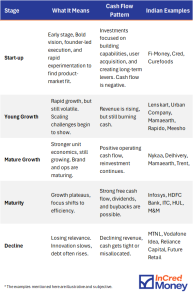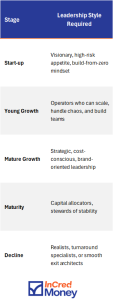Ask any investor who’s been around long enough, and they’ll tell you: companies, like people, grow up. Some never make it past childhood. Some peak gracefully. Others age poorly and pretend it isn’t happening.
I recently came across this video by Aswath Damodaran, the “Dean of Valuation,” who reminded us of this simple truth. Businesses are born. They grow, mature, and eventually, they either adapt… or fade.
The tricky part? Knowing where a company stands in that cycle, and whether it’s acting its age. Because one of the biggest red flags while investing in a company isn’t just slowing growth or falling margins… it’s a company behaving like it’s in the wrong stage of life.
While his examples are mostly U.S.-based, let me try and walk you through the same concept, but with an Indian lens.
Because in fast-moving markets like India, where consumer trends, regulations, and tech adoption move at a rapid pace, understanding the corporate life cycle is crucial for avoiding costly investment mistakes and identifying hidden opportunities.
5 Stages in Corporate Life Cycle
Here’s a snapshot of the five stages. Damodaran also ties these phases directly to cash flow patterns. So, we’ll do the same.

Companies Are Ageing Faster
Once upon a time, it took companies decades to climb this ladder They began small, found their footing, expanded steadily, matured over decades, and only after a long, full life, entered decline.
Tata Steel, founded in 1907, is an example. From colonial-era industrial roots to a modern steel giant with global operations, it has survived wars, policy shifts, market liberalisation, and commodity crashes. Some other examples include Asian Paints, Pidilite, Bajaj Auto.
But those kinds of timelines are now the exception. Today? Not so much. Companies are aging in dog years, especially in tech and consumer internet. Flipkart was a start-up in 2007, an e-commerce leader by 2014, declining market share due to Amazon and eventually got acquired by Walmart in 2018. All within 11 years.
Compare that to Rediff, founded in 1996, Rediff was India’s earliest internet success story. It went public on NASDAQ in 2000 during the first dotcom wave, and was once valued at over $2 billion. Then Gmail killed its email business. Flipkart and Amazon beat it in e-commerce. News portals and apps stole its traffic. Eventually, in 2016, Rediff was delisted from NASDAQ. In 2024, it became a subsidiary of Infibeam Avenues.
Or think of MTNL, how everyone had an MTNL connection once upon a time, and now it has almost ceased to exist. The whole cycle lasted more than 30 years.
The market doesn’t give companies the luxury of time anymore. The cash burn window closes faster. Customer expectations change sooner. Investors lose patience earlier.
Identity Crisis
And when companies misread their life stage, the damage is swift:
Young firms behaving like mature ones: Cutting down on marketing and chasing short-term profits can kill momentum. In other words, a start-up pretending to be a mature cash cow often underinvests in growth.
Mature firms pretending they’re still young: A mature company chasing start-up-style valuations often ends up burning cash on trends it doesn’t fully understand. In their bid to accelerate growth, many such firms turn to aggressive acquisitions—frequently funded by debt. This strategy can backfire when integration fails or the synergies don’t materialize.
General Electric is a classic global example of this playbook gone wrong. Closer to home, Tata Motors and Tata Steel found themselves in similar territory when they acquired companies larger than themselves, Jaguar Land Rover and Corus, respectively, by taking on substantial debt. While these moves eventually stabilized, they stretched balance sheets for years and forced painful restructuring.
Age defines not just your valuation story, but your business model, cost structure, and capital discipline.
The CEO Matters More Than Ever
A company’s leadership needs to evolve just as quickly. Gone are the days when a single CEO guided a firm through all its phases, slowly and steadily.
In the traditional world, companies had time to let CEOs grow into the role. Now? Mismatch between CEO style and company life stage can break a business.

Damodaran gives the example of Elon Musk who is a great visionary and is the kind of leader required for a Start-up or a young growth company, but may not be the right one to manage a Mature Growth company (which Tesla has now become). This is mainly because of the amount of time he spends on X, developing his other companies, furthering his political interests.
With life cycles getting compressed, don’t be surprised if C-suite churn increases. Companies won’t have five years to course-correct leadership anymore. They’ll need to rotate skillsets fast, like changing tires mid-race.
Pray Reliance Doesn’t Enter Your Market
In the video, Damodaran jokes, “Get on your knees and pray Amazon doesn’t enter your industry.” Because they don’t just disrupt, they also shrink your margins, redefine competition, and bend consumer behavior.
In India, it is Reliance Industries.
Reliance has played that role across telecom, retail, FMCG, and now financial services with Jio Blackrock. Their entry often means your margins are gone, your customers are tempted, and your business model needs a rethink, fast.
Act Your Age
Like any framework, this one isn’t flawless. There are exceptions. Some companies manage to reinvent themselves mid-decline. Others defy their stage altogether. But most? Most follow this arc.
And in today’s market, where narratives move faster than fundamentals, understanding where a business is in its life cycle might just be one of the most underrated edges an investor can have.
Let me know—have you seen any Indian companies acting out of their age? Or ones that truly surprised you by adapting well? Would love to hear your thoughts.
I hope you enjoyed this newsletter and if you did, feel free to share it with your friends and family.
Also, if you have any topics that you would like us to cover or any other feedback, do write to us at connect@incredmoney.com
Till the next time,
Vijay
CEO – InCred Money





